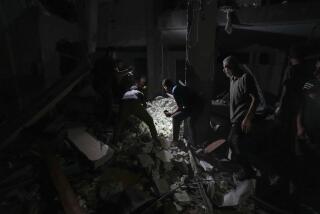Cairo bombing kills four
CAIRO — A bomb exploded Sunday in a bazaar near the historic Hussein mosque in Cairo, killing a Frenchwoman, wounding 18 people and raising fears that Islamic militants may be targeting Egypt’s tourist industry after several years of relative quiet.
The blast was small, but it reverberated through the tight alleys of the centuries-old Khan el Khalili bazaar and sent shopkeepers, coffee shop waiters, worshipers and tourists scrambling for cover. Egyptian state-owned TV reported that a French tourist was killed and the other victims, mostly foreigners, were injured when two masked women tossed a bomb from the roof of a motel just after dusk.
But there were confusion, panic and conflicting reports. Some media quoted police and security forces as saying four people had been killed by a bomb that was thrown from a motorcycle or hidden under a bench in the square. Other reports said a second explosive device was discovered by police and safely detonated. The Interior Ministry did not immediately release a statement.
The blast ripped through the square as worshipers were filing into the mosque and at least two tour buses were parked outside. No one claimed immediate responsibility for the blast and it was unclear whether tourists were targeted.
“I was praying in the Hussein mosque and I heard an explosion, and we went out and I saw two injured children and a tourist with his legs cut off,” said a man, who before he could give his name to journalists was escorted away by a plainclothes policeman.
Islamic extremists in recent weeks have criticized the government of President Hosni Mubarak for not providing aid and assistance to Palestinians during the Israeli incursion into the Gaza Strip. Egypt’s decision to keep its border with Gaza largely closed during the 22 days of fighting intensified the divide in the Arab world between the region’s hard-line political leaders and U.S. allies, such as Egypt, that oppose the militant group Hamas’ control of the Palestinian enclave.
Hamas has close ideological ties to Lebanon’s Hezbollah militant group and Egypt’s Muslim Brotherhood, which the Mubarak government says is intent on creating an Islamic state in this nation of 82 million people. The brotherhood, which has renounced violence inside Egypt, controls 20% of parliament, but hundreds of its members have been arrested in recent years.
“This bombing belongs to the phenomenon of discontinuous and random terror that occurs on a limited scale,” said Mohamed Abdel Salam, an Egyptian security expert. “It is usually perpetrated by a group of individuals who do not belong to any organization, use primitive tools and hit only available targets.”
He added: “Definitely, this bombing has to do with the war on Gaza and the animosity aroused against Egypt in the region.”
Egypt was shaken by terrorist plots and bombings over the last decade, including a 1997 militant attack that killed 63 people, most of them tourists, in Luxor. That attack temporarily crippled the tourist industry, and was followed by two well-orchestrated assaults, including the 2005 bombings in the resort of Sharm el Sheik that killed more than 60 people. That same year a bombing near the Hussein mosque killed three people: two French citizens and an American.
About 13 million people visited Egypt in 2008, bringing in more than $10.5 billion, making tourism one of the country’s most lucrative industries.
On Sunday night, the square outside the mosque, a 12th century shrine dedicated to the prophet Muhammad’s grandson, was littered with shattered glass, toppled chairs, scattered marble fragments and strands of yellow police tape. Egyptians and tourists searched for friends and loved ones; the explosion injured 10 Frenchmen, three Saudis, four Egyptians and one German.
“I was praying and I came out and saw a man and a woman lying on the ground,” Mahmoud Abdullah Salam said. “The ambulance came and took them away. Just five minutes earlier it was calm and normal, and then it all went upside down.”
--
More to Read
Sign up for Essential California
The most important California stories and recommendations in your inbox every morning.
You may occasionally receive promotional content from the Los Angeles Times.











